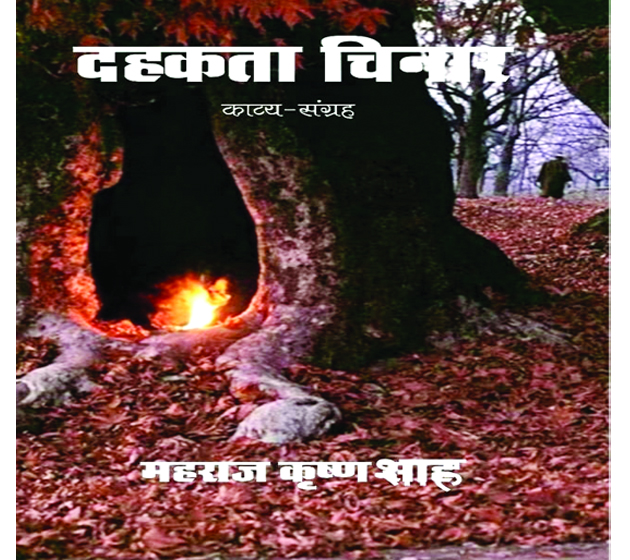Avtar Mota
Name of book : DEHAKATA CHINAR
(KAVYA-SANGRAH)
Author: Maharaj Krishen Shah
Publisher : YASHITA PUBLICATION PVT. LTD.
Price : Rs 299
Maharaj Krishen Shah is possibly the first person in the early 1990s to have visited camps in Jammu and documented the pain and suffering of Kashmiri Pandits through his tele-film. He is a filmmaker , Hindi poet , actor , teacher , media personality and runs of an independent YouTube channel . He headed ETV Rajasthan for some years and at the moment he edits Koshur Samachar published from New Delhi. He has been awarded by Ministry of Information and Broadcasting and Uttar Pradesh government for his constructive role as writer and journalist. He has already published three well received books titled, ‘ Crescent Moon’ ( short story collection ),’ Pravaah Vitasta ka’ ( biography ) and ‘Television Karyakram Nirmaan Prakriya ‘ ( jointly with Ashok Jailkhani ). After the first group of successful Hindi writers like S S Toshakhani, Hari Krishen Kaul, R L Shant, Chandrakanta , and many more , he is one amongst the second group of young Hindi writers from the Kashmir valley who earned name and fame for their contribution . Others in this second group include Agnishekhar, Kshama Koul, Maharaj Krishen Santoshi , Nida Nawaz and a few more . He hails from Mattan , the historic town that produced men like Mahatma Parmanand ( saint poet ) and Pandit Kripa Ram Datt who sacrificed his life in the battle of Chamkaur Sahib fighing against the army of Wazir Khan aided by Mughal forces. Pandit Kripa Ram had joined the forces of Guru Gobind Singh . He had led the delegation of 500 Kashmiri Pandits to Guru Tegh Bahadur during the dark days of Afghan rule in the Kashmir valley.
Edward Said, in his essay ‘Reflections on Exile,’ defined exile as ‘the unhealable rift forced between a human being and a native place, between the self and its true home: its essential sadness can never be surmounted’. The book under review has 48 poems ( blank verse ) spread over 95 pages with an engrossing foreword by Dr Shiben Krishen Raina . Almost all the poems in this collection revolve around the subject of exile , pain , suffering , nostalgia and banishment . The poems carry the same artistic restlessness and the unending inquiry with complex questions about exile, identity, language, politics, and faith. One quality of these poems is that the poet does not allow himself to either feel delighted or intrigued by the elusive promise of return. He has sidetracked the issue of so called “Honourable Return ” of exiles from Kashmir to their native place. Shah’s poems bring a feeling similar to the poems of Aria Aber ( Afghan refugee poetess who was brought up in Germany ), Choman Hardi (exiled Kurdish poetess ) , Nazand Begikhani ( exiled Kurdish poetess) and Kajal Ahmed ( exiled Kurdish poetess and journalist ). Through the poems in this collection, Shah finds subtle parallels between his oppression as a member of the microscopic minority community and his subjugation as Kashmiri Pandit by a mindset that was swayed by intolerance and hate. At the same time, Shah’s poems also demonstrate a strong commitment towards the Kashmiri culture and its preservation .
I quote excerpts from some poems to substantiate what I have said above .
(1)
“Ke jis raah chalta huun
Nirantar chalta hi ja raha huun
Apni zameen se juda
Aasmaan se kata
Nirantar shunya se ladta
Shunya bharta
Mausam ko akhbaaron mein
padta ja raha huun”
( from the poem ‘Samay’ )
( The path that I chose for myself ,
I keep moving on it incessantly ,
Severed from the roots,
Cut off from the sky ,
I fight the emptiness perpetually,
And fill up the vacuum within .
Only through newspapers ,
I keep track of the changing seasons .)
(2)
“Eik daur dushmani ka tum ne nibhaaya hai,
Eik daur dosti ka mein nibhaoonga ,
Aao meri duniya ujhaadne vaalon
Duniya basaana tum ko sikhaoonga ”
( from the poem ‘Eik geet teray naam ‘)
( You fulfilled the promise of your enmity ,
Let me also fulfill my friendship’s promise .
Come all you,
My tormentors ,
Come ,
let me teach you
the skills of worldly settlement .)
(3)
“Kaagaz si jal rahi hai zindagi
Siyaahi sa ubhar kar aa raha huun
Nahin maloom kya hai swar aur lai
Mein to bus apni dhun me gaa rahaa huun”
(from the poem ‘Priy mitar santoshi ke naam’)
( Life burns like a piece of paper,
Like ink , I keep emerging on it .
I know nothing about notes and melodies ,
I sing my own jingles.)
(5)
“Shahar ujhadna
Dharti ka sikudna,
Hawa ka rukh badalna
Jinhe dikha nahin,
Woh aaj
Pull tootne
ki baat karte hain”
( from the poem ‘Atoot Rishta’ )
( yesterday ,
those who couldn’t see,
how the city was ravaged,
how spaces were shrunk,
and how people changed faces,
today, these very people
talk about the
Shattered bridges.)
Most of the poems in this collection speak in a direct tone that is free from metaphors or similes while some poems included in this collection carry a deep nostalgia that is seem in the poems of Christina Rossetti .However, the major issue surfacing in most of the poems in this compilation is exile and separation from motherland. I would like to mention some more impressive poems like , Vida ( parting ),Hum To Khanabadosh Hain ,Jaane Se Pehle ,Sapne Jeevan ke ,Bheetar Tak,Tapti Bahaar, Kaun Ujhaad Gaya Sab, Beet Gaye Din Rein,Virus and Sach Bolna Paap hai . I recommend this poetic collection to all the lovers of literature in general and poetry in particular.


